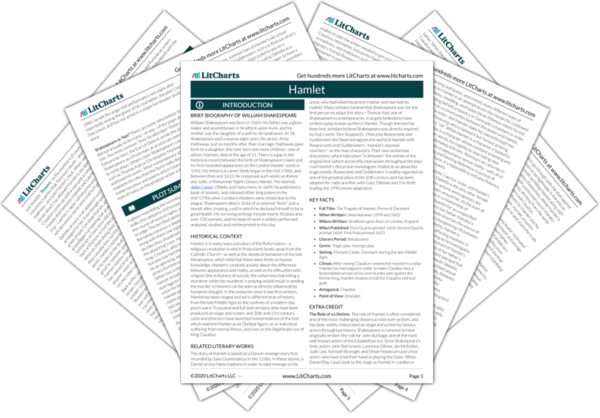Hamlet Quotes in Hamlet
Seems, madam! Nay, it is; I know not “seems.”
O, that this too, too sullied flesh would melt,
Thaw, and resolve itself into a dew.
Frailty, thy name is woman!
Thrift, thrift, Horatio! The funeral baked meats
Did coldly furnish forth the marriage tables.
Something is rotten in the state of Denmark.
O, villain, villain, smiling, damnèd villain!
There are more things in heaven and earth, Horatio,
Than are dreamt of in your philosophy.
There is nothing either good or bad, but thinking makes it so.
O God, I could be bounded in a nutshell, and count myself a king of infinite space, were it not that I have bad dreams.
What a piece of work is a man, how noble in
reason, how infinite in faculties, in form, in moving
how express and admirable; in action how like
an angel, in apprehension how like a god: the
beauty of the world, the paragon of animals—and
yet, to me, what is this quintessence of dust?
What’s Hecuba to him, or he to Hecuba,
That he should weep for her?
The play’s the thing,
Wherein I’ll catch the conscience of the king.
To be or not to be—that is the question:
Whether ’tis nobler in the mind to suffer
The slings and arrows of outrageous fortune,
Or to take arms against a sea of troubles
And, by opposing, end them.
Get thee to a nunnery. Why wouldst thou be a breeder of sinners? I am myself indifferent honest, but yet I could accuse me of such things that it were better my mother had not borne me…
Why, look you now, how unworthy a thing you make of me! You would play upon me, you would seem to know my stops, you would pluck out the heart of my mystery… ’Sblood, do you think I am easier to be played on than a pipe? Call me what instrument you will, though you can fret me, you cannot play upon me.
CLAUDIUS: What dost thou mean by this?
HAMLET: Nothing but to show you how a king may go a progress through the guts of a beggar.
Alas, poor Yorick! I knew him, Horatio—a fellow of infinite jest… Where be your gibes now? your gambols? your songs? your flashes of merriment that were wont to set the table on a roar?
We defy augury. There is a special providence in the fall of a sparrow. If it be now, ’tis not to come; if it be not to come, it will be now; if it be not now, yet it will come. The readiness is all.
Now cracks a noble heart. Good night, sweet prince,
And flights of angels sing thee to thy rest.

Hamlet Quotes in Hamlet
Seems, madam! Nay, it is; I know not “seems.”
O, that this too, too sullied flesh would melt,
Thaw, and resolve itself into a dew.
Frailty, thy name is woman!
Thrift, thrift, Horatio! The funeral baked meats
Did coldly furnish forth the marriage tables.
Something is rotten in the state of Denmark.
O, villain, villain, smiling, damnèd villain!
There are more things in heaven and earth, Horatio,
Than are dreamt of in your philosophy.
There is nothing either good or bad, but thinking makes it so.
O God, I could be bounded in a nutshell, and count myself a king of infinite space, were it not that I have bad dreams.
What a piece of work is a man, how noble in
reason, how infinite in faculties, in form, in moving
how express and admirable; in action how like
an angel, in apprehension how like a god: the
beauty of the world, the paragon of animals—and
yet, to me, what is this quintessence of dust?
What’s Hecuba to him, or he to Hecuba,
That he should weep for her?
The play’s the thing,
Wherein I’ll catch the conscience of the king.
To be or not to be—that is the question:
Whether ’tis nobler in the mind to suffer
The slings and arrows of outrageous fortune,
Or to take arms against a sea of troubles
And, by opposing, end them.
Get thee to a nunnery. Why wouldst thou be a breeder of sinners? I am myself indifferent honest, but yet I could accuse me of such things that it were better my mother had not borne me…
Why, look you now, how unworthy a thing you make of me! You would play upon me, you would seem to know my stops, you would pluck out the heart of my mystery… ’Sblood, do you think I am easier to be played on than a pipe? Call me what instrument you will, though you can fret me, you cannot play upon me.
CLAUDIUS: What dost thou mean by this?
HAMLET: Nothing but to show you how a king may go a progress through the guts of a beggar.
Alas, poor Yorick! I knew him, Horatio—a fellow of infinite jest… Where be your gibes now? your gambols? your songs? your flashes of merriment that were wont to set the table on a roar?
We defy augury. There is a special providence in the fall of a sparrow. If it be now, ’tis not to come; if it be not to come, it will be now; if it be not now, yet it will come. The readiness is all.
Now cracks a noble heart. Good night, sweet prince,
And flights of angels sing thee to thy rest.
















